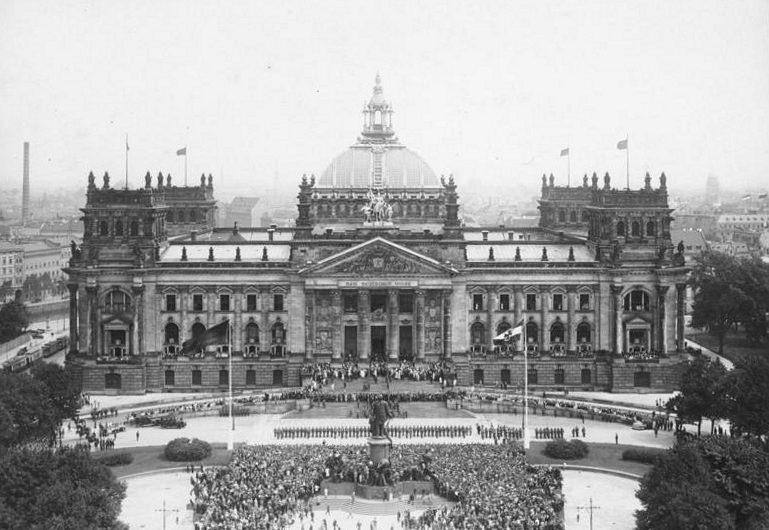
Bundesarchiv via Wikimedia Commons
Partisan Divides and Popular Fronts

Benjamin Carter Hett
Hunter College and the Graduate Center, CUNY
Born in Rochester, NY, Benjamin Carter Hett earned a JD at the University of Toronto (1990) and practiced litigation in Canada before earning a PhD in history at Harvard (2001). He has taught at Harvard College and the Harvard Law School and, since 2003, at Hunter College and the Graduate Center, City University of New York. He is the author of The Death of Democracy: Hitler’s Rise to Power and the Downfall of the Weimar Republic, winner of the 2019 Vine Award for History and named one of the year’s best books by The Times of London and the Daily Telegraph, and The Nazi Menace: Hitler, Churchill, Roosevelt, Stalin, and the Road to War, named an editors’ choice by the New York Times Book Review. His other books include Burning the Reichstag (Oxford, 2014), winner of the 2015 Hans Rosenberg Prize, and Crossing Hitler (Oxford, 2008), which won the 2007 Fraenkel Prize and was made into a documentary film and a television drama for the BBC. Dr. Hett is presently working on a project about Arthur Nebe and the German criminal police during the Second World War.
We are pleased to inaugurate the AGI 40th Anniversary series with the following article, which coincides with the 90th anniversary of the Nazi seizure of power (Machtergreifung) when Hitler was appointed chancellor on January 30th, 1933, as well as with Holocaust Memorial Day on January 27th, the 78th anniversary of the liberation of Auschwitz.
In the morning, a tense group of politicians, who did not much like or trust one another, gathered outside the office of Reich President Paul von Hindenburg. Three of them came from the National Socialist Party, but the others were men of the traditional conservative establishment, who felt themselves forced into an unattractive deal with the radical newcomers. Down to the last minute, they bickered about the terms of that deal. Finally, the president’s state secretary lost patience and told the politicians they could not keep the president waiting any longer. A grudging deal was struck, the door opened, and the president gave the new cabinet ministers their oaths of office.
“We are in the Wilhelmstrasse,” the new government’s propagandist wrote that night in his diary. “Like a fairy tale.” His name was Joseph Goebbels. That night Goebbels organized a torchlight parade of the party faithful. His boss, of course—the newly sworn chancellor of the German Reich—was Adolf Hitler.
Monday, January 30, marks the 90th anniversary of this most consequential event of the twentieth century. We know the scale of the catastrophe that Hitler’s regime ushered in. Virtually all historians agree (a rare thing indeed): if there had been no Hitler, there would have been no Second World War, and no Holocaust.
We need to remember that there was nothing inevitable about Hitler’s success. He and his party could have been held from power in many different ways. He became chancellor because other politicians made choices they did not have to make, believing they were pursuing their own best interests. Above all, we need to keep in mind that in free elections—when German voters could still make real choices—the Nazis only ever won the support of a minority of their fellow citizens. Politicians of the majority could always have stopped them.
To understand this, let’s look a little more closely at the German political system of that time.
The Germany of the Weimar Republic, from 1918 to 1933, boasted a bewildering variety of political parties. This fact, combined with Weimar’s proportional electoral system, resulted in a high degree of instability at the national level (a bit like Israel in recent years). Depending on how one wants to define a “Weimar” administration (does Hitler’s first cabinet count?) there were as many as twenty-one different governments in just over fourteen years.
But at a deeper level, there was an important stability in German politics. Political scientists suggest that the dozens of political parties really broke down into no more than three main groups: the socialist group, the Catholic group, and the Protestant middle-class group. Furthermore, the vote shares for these groups—if not always for the individual parties within them—remained remarkably stable over the Weimar years. What happened between 1929 and 1933 was that the Nazis almost completely took over the Protestant middle-class group. They made very limited inroads into the Catholic and the socialist groups, with the result that the Nazis’ best result in a fully free election was only just over one-third of the popular vote.
The single most urgent priority in American politics is the preservation of American democracy, and to this end, we need to build a broad coalition… Doing so will require the abandonment of doctrinaire rigidities and the recognition of the seriousness of the threat.
This is where an alternative scenario becomes imaginable. A broad alliance of the non-Nazi parties from the left and center—encompassing the Catholic, socialist, and some elements of the Protestant groups—could have kept the Nazis from power and even overturned by a majority vote in the Reichstag anything that President von Hindenburg or others might have done through the emergency decrees the Weimar constitution permitted. Such an alliance could have preserved a non-Nazi Germany.
This means above all that Germany’s Communist Party (KPD) would have had to forge an alliance with the more moderate Social Democratic Party (SPD), the main Catholic party (the Center), and elements of the middle-class center-right. Admittedly this would have been a very tall order. The Communists particularly hated the Social Democrats and were entirely under the orders of Joseph Stalin and the Soviet regime in Moscow. Stalin forbade any alliances with other parties, including what Communist rhetoric called the “social fascist” Social Democrats. Politicians from all German parties were deeply reluctant to make compromises or deals with others. Sometimes politicians who grudgingly accepted the need to compromise were then mocked after the fact for lack of principle by the very opponents who had benefitted from those deals.
But three years after Hitler came to power, when it was too late for Germany, Stalin changed his strategic approach and accepted that broad alliances were essential to stop fascism. Politicians of good will in other camps reached the same conclusion. “Popular Front” governments came to power in Spain and France. The French Popular Front was precisely that alliance of the Communists, the Socialists, and the middle-class center (represented by the very inappropriately-named Radical Party) that could have stopped Hitler in Germany. Arguably the Popular Front kept France free of fascism at a critical juncture in the mid-1930s, and no anti-democratic government made it to power in France until German tanks were in Paris in 1940.
Is there a lesson we can take from this experience? Drawing lessons from history is of course a notoriously fraught endeavor. But it is eye-catching that the one-third of the German electorate that freely chose the Nazis is roughly equal to the share of the American electorate that still seems to back Donald Trump. Recent experience—including the 2022 midterm elections—has shown ever more clearly the limits of Trump’s appeal and the potential successes that can be gained by building a coalition to limit his impact and that of his most rabid supporters.
But the threats of some kind of extremist insurgency remain real, and now we face such dismal realities as having avowed violent insurgent Marjorie Taylor Greene sitting on the House Homeland Security Committee. The single most urgent priority in American politics is the preservation of American democracy, and to this end, we need to build a broad coalition from, so to speak, Alexandria Ocasio Cortez to Liz Cheney. Doing so will require the abandonment of doctrinaire rigidities and the recognition of the seriousness of the threat. As in Weimar Germany, this will be a tall order. But as in Weimar Germany, the alternative is much, much worse.









